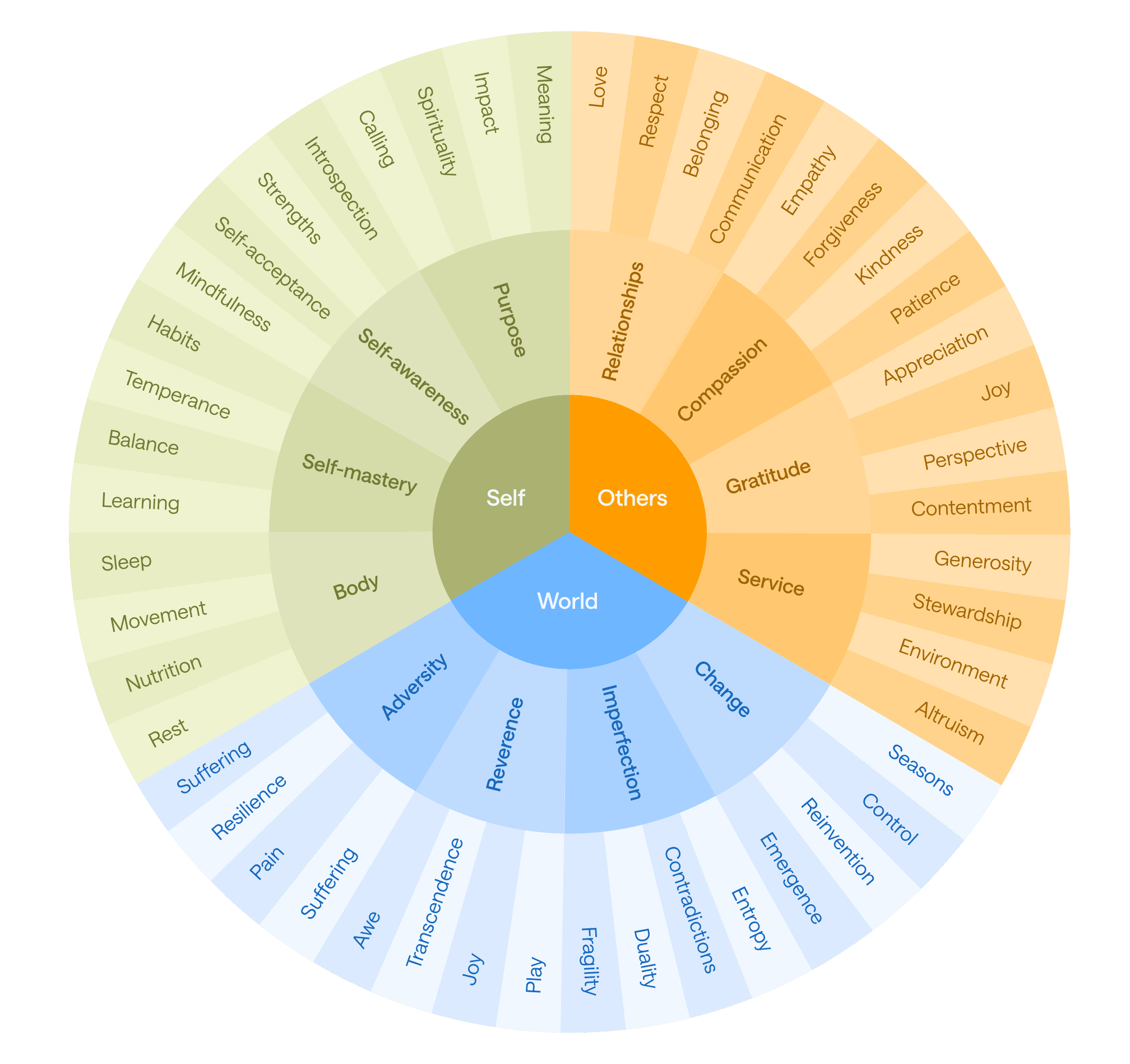Guiding themes for living a meaningful life
Somewhere deep inside all of us is a feeling - often framed as a question. A question that’s hard to articulate, but is core to the human experience:
How should I live my life? How do I live a happy life? Or as we are exploring at Rokk, ‘How do I live a meaningful life?’
Throughout history the answers to these questions have been explored through many different lenses, ancient and modern; from art, philosophy and religion to literature, psychology and science.
So, considering the collective expanse of human knowledge, are there universal answers on how to live a meaningful life? We believe there are.
It’s time to focus on what matters
There’s certainly no shortage of ‘answers’ out there, but sometimes abundance can be a barrier in itself. Navigating an ocean of sources can be overwhelming, with no guarantee for quality.
So, through our extensive research - spanning a broad range of trusted sources, both ancient and modern - we’ve identified a blueprint of topics and patterns that appear again and again across time, culture and disciplines. They reveal 12 Guiding Themes to support a meaningful life.
These Guiding Themes fit into three broad categories: knowing yourself, your relationship with others, and understanding the world.
You can think of each theme as a primary principle that serves as a foundation for exploring related ideas - in a way that’s materially useful to your everyday life.
Introducing the 12 Guiding Themes

Know yourself
Find purpose – Having a strong sense of purpose brings clarity, motivation, and meaning to life. Whether it’s found in work, relationships, habits, or spiritual practice, purpose helps anchor you and guide your decisions.
Related concepts: meaning, impact, calling, goals, spirituality
Deepen self-awareness - Self-awareness is the foundation of personal growth and meaningful relationships. The more you understand your strengths, values, and patterns, the better equipped you are to live and connect with intention.
Related concepts: introspection, talents, strengths, self-acceptance, mindfulness, presence
Cultivate self-control – Growth requires action. Real change often looks different in practice than in theory. This theme is about effort, consistency, and the self-discipline to keep growing.
Related concepts: Habits, temperance, balance, learning, agency
Prioritise body – Physical and mental health are deeply connected. Basics like sleep, nutrition, and movement provide the energy and resilience needed to live well.
Related concepts: Sleep, movement, exercise, nutrition, rest
Connect with others
Nurture relationships – Connection is a core human need. Strong relationships—built on trust, listening, and care—help us feel grounded and supported in a busy and often digital world.
Related concepts: Communication, love, dependence, respect, belonging
Show compassion – Compassion helps one recognizing the struggles of others and respond with kindness. It includes empathy, patience, and forgiveness—for others and for yourself.
Related concepts: Empathy, forgiveness, kindness, patience
Practice gratitude – Gratitude helps one shift focus from what’s missing to what’s already there —fostering joy, contentment, and perspective.
Related concepts: Appreciation, joy, perspective, contentment
Embody service – Helping others—through your time, energy, or resources—matters. It supports your wellbeing as much as theirs. That includes loved ones, your local community, and even future generations.
Related concepts: Giving, stewardship, generosity, altruism, environment
Understand the world
Embrace adversity – Life is challenging by nature. Resilience, courage, and persistence help us face tough moments—and can reveal strength and gratitude along the way.
Related concepts: Suffering, pain, courage, resilience, grit, hope, luck
Awaken reverence – Reverence is about seeing life with fresh eyes—appreciating its beauty, mystery, and scale. It invites awe, play, and the humility of knowing you’re a small part of a much bigger whole.
Related concepts: Awe, transcendence, wonder, beauty, joy, play
Accept imperfection – Imperfection is part of life. Learning to live with contradiction, messiness, and duality builds acceptance and balance in how you see yourself and the world.
Related concepts: Fragility, duality, contradictions, entropy
Welcome change – Change is constant. Learning to let go, adapt, and flow with life’s shifts can bring peace and resilience—even when you can’t control the outcome.
Related concepts: Cycles, seasons, metamorphosis, emergence, reinvention, control
Bringing the guiding themes to life
Understanding the themes is only a first step. Living them is what truly matters.
This is what Rokk is all about: creating a foundation for you to seamlessly integrate all of this into daily life. More on that coming soon.
In the meantime, if this is something that resonates with you, please join our waitlist and you will be the first to know once we’re ready to share more.
We’d also greatly appreciate it if you could fill in this quick 3 minute survey about the 12 Guiding Themes so we can get your personal perspectives on some of our initial research.
Marcus & the Rokk team